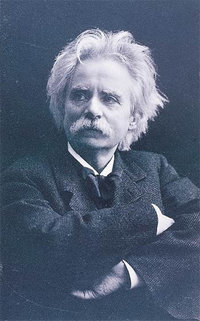| B i o g r a p h y |
 Edvard Hagerup Grieg
(15 June 1843 – 4 September 1907) was a Norwegian composer and
pianist who composed in the romantic period. He is best known for his
Piano Concerto in A minor, for his incidental music to Henrik Ibsen's
play Peer Gynt (which includes In the Hall of the Mountain King), and
for his Lyric Pieces for the piano.
Edvard Hagerup Grieg
(15 June 1843 – 4 September 1907) was a Norwegian composer and
pianist who composed in the romantic period. He is best known for his
Piano Concerto in A minor, for his incidental music to Henrik Ibsen's
play Peer Gynt (which includes In the Hall of the Mountain King), and
for his Lyric Pieces for the piano.
Grieg was born in Bergen, and was the original family name was
spelled "Greig". After the Battle of Culloden in 1746, his
great-grandfather travelled widely, settling in Norway around 1770, and
establishing business interests in Bergen. Edvard was brought up in a
musical home. His mother, Gesine, became his first piano teacher. He
studied in several schools, and often brought in examples of his music
to his class. The children were fascinated by it, but the teachers
regarded it as inferior. He was known as a lazy pupil.
In the summer of 1858, Grieg met the eminent Norwegian violinist Ole
Bull, who was a friend of the family, and whose brother was married to
Grieg's aunt. Bull noticed the 15-year-old boy's talent and persuaded
his parents to send him to further develop his talents at the Leipzig
Conservatory, then directed by Ignaz Moscheles.
Grieg enrolled in the conservatory, concentrating on the piano, and
enjoyed the numerous concerts and recitals given in Leipzig. He
disliked the discipline of the conservatory course of study, yet he
still achieved very good grades in most areas, the exception being the
organ, which was mandatory for piano students, at the time. In the
spring of 1860, he survived a life-threatening lung disease. The
following year he made his debut as a concert pianist, in Karlshamn,
Sweden. In 1862, he finished his studies in Leipzig, and held his first
concert in his home town of Bergen, where his programme included
Beethoven's Pathétique sonata. (Grieg's own recording of his
Piano Sonata, made late in his life, shows he was an excellent pianist).
In 1863, Grieg went to Copenhagen, Denmark, and stayed there for
three years. He met the Danish composers J. P. E. Hartman, and Niels
Gade. He also met his fellow Norwegian composer Rikard Nordraak
(composer of the Norwegian national anthem), who became a good friend
and source of great inspiration. Nordraak died shortly after, and Grieg
composed a funeral march in his honor. Grieg had close ties with the
Bergen Philharmonic Orchestra (Harmonien) and was Music Director of the
orchestra from 1880-1882.
On 11 June 1867, Grieg married his first cousin, Nina Hagerup. The
next year their only child, Alexandra, was born. The following summer,
Grieg wrote his Piano Concerto in A minor while on holiday in Denmark.
Edmund Neupert gave the concerto its premiere performance on 3 April
1869 in the Casino Theater in Copenhagen. Grieg himself was unable to
be there due to commitments conducting in Christiania (as Oslo was then
named).
In 1868, Franz Liszt, who up to that time had not met Grieg, wrote a
testimonial for him to the Norwegian Ministry of Education, which led
to Grieg obtaining a travel grant. The two finally met in Rome in 1870.
On Grieg's first visit, the two went over Grieg's Violin Sonata No. 1,
which pleased Liszt greatly. On the second visit, in April, Grieg
brought with him the manuscript of his Piano Concerto, which Liszt
proceeded to play by sight (including the orchestral arrangement).
Liszt's rendition greatly impressed his audience, although Grieg gently
pointed out to him that he played the first movement too quickly. Liszt
also gave Grieg some advice on orchestration, (e.g. to give the melody
of the second theme in the first movement to a solo trumpet).
In the summer of 1869, Grieg's daughter Alexandra became ill and died, at the age of 13 months.
In 1876, Grieg created incidental music for the premiere of Ibsen's
play Peer Gynt, at the request of the author. Many of the pieces from
this work became very popular in the form of orchestral suites or piano
and piano-duet arrangements.
In 1888, Grieg met Tchaikovsky in Leipzig. Grieg was later struck by
the sadness in Tchaikovsky. Tchaikovsky thought very highly of Grieg's
music, praising its beauty, originality and warmth.
Grieg's later life brought him fame but not wealth.[citation needed] The Norwegian government awarded him a pension.
Edvard Grieg died in the autumn of 1907, aged 64, after a long period of illness. The funeral drew thousands out on the streets of his home town to honour the artist. Following his wish, his own funeral march was played. The funeral march by Frederic Chopin was played as well. His and his wife's ashes are entombed in a mountain crypt near his house, Troldhaugen.